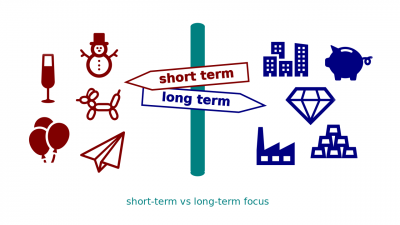Difference between revisions of "Corporate governance"
| Line 1: | Line 1: | ||
| − | [[Corporate governance]] is the set of rules that control a company's behavior toward its directors, managers, employees, shareholders, creditors, customers, competitors, and community. | + | [[File:Long-vs-short.png|400px|thumb|right|[[Corporate governance]]]][[Corporate governance]] is the set of rules that control a company's behavior toward its directors, managers, employees, shareholders, creditors, customers, competitors, and community. |
Revision as of 09:14, 3 November 2019
Corporate governance is the set of rules that control a company's behavior toward its directors, managers, employees, shareholders, creditors, customers, competitors, and community.
Definitions
According to Financial Management Theory and Practice by Eugene F. Brigham and Michael C. Ehrhardt (13th edition),
- Corporate governance. The set of rules that control a company's behavior toward its directors, managers, employees, shareholders, creditors, customers, competitors, and community.
According to Fundamentals of Financial Management by Eugene F. Brigham and Joel F. Houston (15th edition),
- Corporate governance. Establishment of rules and practices by Board of Directors to ensure that managers act in shareholders' interests while balancing the needs of other key constituencies.
Related concepts
- Financial management. A combination of enterprise efforts undertaken in order to procure and utilize monetary resources of the enterprise.
